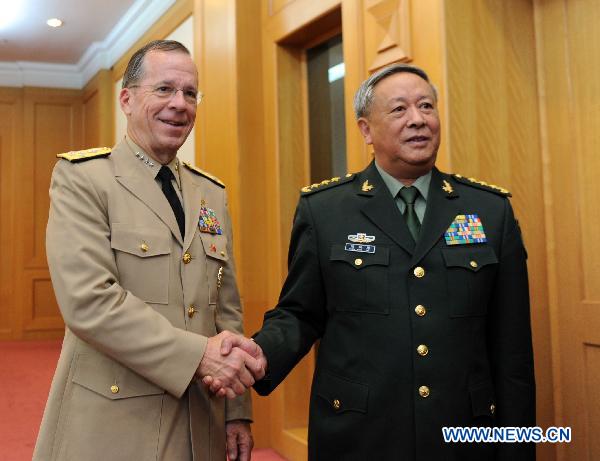Who worries about arms race more, China or the U.S.?
- By Du Jianguo
 0 Comment(s)
0 Comment(s) Print
Print E-mail
China.org.cn, August 17, 2011
E-mail
China.org.cn, August 17, 2011
|
|
|
Chen Bingde (R), Chief of the General Staff of the Chinese People's Liberation Army (PLA), meets with Chairman of the U.S. Joint Chiefs of Staff Mike Mullen in Beijing, capital of China, July 11, 2011. (Xinhua/Zhang Duo) |
Will arms race break out between China and the U.S.? If the answer is "yes," then what will the outcome be?
Many people, especially the Chinese, are already accustomed to U.S. might. In their opinion, the world's sole superpower is all-powerful. Challenging it is self-defeating. It has not only been so in the past, but also will continue to be for the foreseeable future.
Former U.S. Defense Secretary Robert Gates said on his flight to Singapore that China had "learned powerful lessons from the Soviet experience" and didn't seem to be ready to compete with the United States on all fronts.
But Gates's remarks are more diplomatic intimidation than an objective assessment of the strength of both sides. Only two weeks ago, he had made a more pessimistic judgment on the future of the U.S. military force. Speaking at the University of Notre Dame's commencement ceremony on May 22, he said the ultimate guarantee against the success of aggressors, dictators and terrorists in the 21st century is size, strength and steel. Gates was very clear: Sophisticated weapons are not enough to guarantee the success. Only advanced weapons plus sufficient scale equals hard power, which depends on strong manufacturing capabilities and a sufficient military budget. He stressed again two days later in his speech that despite financial constraints, the U.S. should not make more defense cuts. Or it would be impossible to guarantee the scale and superiority of the U.S. military.







Go to Forum >>0 Comment(s)